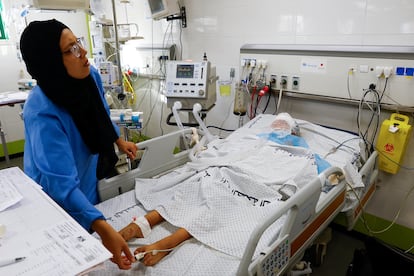Beyond Israel’s bombings: The other deadly threats in Gaza
The lack of fuel and medicine in the enclave is putting at risk the lives of patients who depend on a respirator or an incubator, as well as the 350,000 people suffering from cancer, diabetes, heart and kidney diseases
In Gaza, people’s lives are hanging by a thread due to the lack of medicine and fuel in hospitals. The risk of death from shelling in Gaza was high, even before Israel announced on Saturday the start of a new phase of attacks, which is expected to be even bloodier. In the 22 days since Israel began its siege, more than 7,700 Palestinians have been killed in the bombings, according to Gaza authorities.
But people who suffer from chronic diseases that require medical treatment are at extra risk. This includes diabetes patients who need insulin; cancer patients undergoing radiotherapy or chemotherapy; people with kidney failure who require dialysis and cardiovascular patients who must take daily medication. In total, the World Health Organization (WHO) estimates that there are 350,000 people in this situation in Gaza.
When a person’s life depends on electricity
Of these 350,000 patients, at least 9,000 have some type of cancer (principally breast, liver or lung cancer) and are now no longer able to receive treatment. Before the Hamas attack on Israel on October 7, around 2,000 cancer patients traveled to the West Bank, Jerusalem and other parts of Israel to receive chemo or radiotherapy, which is not available in Gaza. These patients can no longer leave.
The rest of the cancer patients in Gaza went to the Turkish-Palestinian Friendship Hospital, the only specialized center in the enclave. On October 17, the hospital’s general director, Dr. Sobhi Sikk, announced that they had to suspend “a large part of their services” and that the center would close within two days. A week later, the WHO Middle East Office (EMRO) confirmed that the hospital was operating “partially” due to the lack of fuel.
Israel’s unprecedented bombings, its closure of border crossings and decision to cut water and electricity to Gaza are pushing the territory’s health system to the limit. Currently, 34% of hospitals are no longer in service, nor are 64% of primary healthcare centers. Those that remain open lack supplies and fuel, which is essential for hospitals to continue functioning. According to Doctors of the World, seven hospitals have had to close due to the damage from the bombings, the lack of power and the evacuation orders from the Israeli army. David Cantero, the head of the Doctors Without Borders (MSF) mission in Jerusalem, says that the health system is on the verge of collapse. “Israel must allow the unconditional entry of humanitarian aid that includes water, food, medicine and fuel,” he said.
“The lives of many critically ill and fragile patients hang in the balance: those in intensive care or who rely on life support; patients undergoing hemodialysis; newborns in incubators,” the WHO said in a statement, pointing out that 17 hospitals remain operational in northern Gaza despite the evacuation order. “Forcing more than 2000 patients to relocate to southern Gaza, where health facilities are already running at maximum capacity and unable to absorb a dramatic rise in the number of patients, could be tantamount to a death sentence.”
The limited humanitarian aid that has so far entered through the Rafah crossing in the south has not reached hospitals in the north. The lack of fuel in Gaza most immediately affects people whose lives now depend on electricity. Cantero warns that when the generators stop, the machines providing life-supporting care will shut down “in a matter of minutes.” “People in intensive care, most of them connected to respirators, and children who are in incubators, will be the first victims,” he says.

This includes Mecca, a baby girl born prematurely on October 21 after a bombing killed her mother, Dareen. Doctors were able to deliver the baby by cesarean section and she has been surviving in an incubator ever since. Like her, 130 newborns depend on these neonatal units.
Hemodialysis machines are also a lifeline for at least 1,000 Gazans who suffer kidney failure, including 38 children. They, too, are also about to stop working, warns Raquel Martí, the executive director in Spain of the United Nations committee for Palestine Refugees in the Middle East (UNRWA). “Before [the Hamas attack] there were 30,000 dialysis sessions per month, and for that we needed 13,000 filters, 13,000 blood collection tubes and 26,000 cannulas. But since the offensive began, this material has not entered the enclave,” she explains, in reference to the treatment that purifies the blood when the kidneys are not able to do so.
Last week, Iyad Issa Abu Zaher, the general director of Al-Aqsa Martyrs Hospital in Deir al Balah, told Al Jazeera that they were reducing dialysis sessions. “A kidney dialysis patient now undergoes treatment once or twice a week for an hour or two, but before they used to come in three times a week,” he said.
Plestia Alaqad is a Palestinian journalist from Gaza and is one of the few reporters who has been able to share news after Gaza was left without internet or phone coverage on Friday due to the bombings. On Saturday, Alaquad warned that the situation was getting worse by the minute. “There is no [network] service. That means that if you are dying you cannot call an ambulance, and some ambulances cannot continue running because they have run out of fuel. Hospitals are going to stop working at any moment due to lack of electricity,” she said, in line with the warnings in the latest emergency situation report from the WHO office.
Among those most at-risk are pregnant women. There are around 50,000 pregnant women in Gaza, of which 5,500 will give birth next month. They also need continuous monitoring, including ultrasounds, as well as certain vitamins or supplements, which are impossible to find. Before the invasion, 40% of pregnant women suffered from anemia and feeding difficulties, a situation that is going to worsen. “They are the first to suffer malnutrition. They are not being given the vitamins they need to have a normal pregnancy and to ensure the child is not born with deficiencies,” said Martí, who adds that an average of 183 births are being recorded daily in Gaza.
Furthermore, given the critical situation of hospitals, many women are choosing to give birth at home, which increases the risk of maternal and neonatal mortality.
Essential medications
The Palestinian Health Ministry estimates that, since the conflict broke out, Gaza is using up a month’s worth of medical supplies every day. “All medications and medical supplies are running out, including those needed for immediate response to victims [e.g., saline solution, anesthesia], those needed to treat long-term conditions [e.g., insulin], and medications that save the lives of newborns,” denounces the WHO office for the Middle East.
Anesthesia was being used for those injured in Israel’s airstrikes, but hospitals are running out, which is forcing doctors to perform very invasive surgeries, such as amputations, without sedation. Blood for transfusions is also in short supply, and even if it were not, it is impossible to keep it refrigerated if there is no electricity.
Patients with cardiovascular conditions are also a cause of concern because it is one of the leading causes of mortality in the Palestinian territories. The top cause is hypertension, which affects 10% of the adult population.
But the most sought-after drug is insulin. In Gaza, 16% of the over-40 population is diabetic and depends on insulin, but this treatment is increasingly difficult to obtain
Rawya Halas, the head of a UNRWA shelter in Khan Yunis, described the desperate situation at the center, where 15,000 people were in need of water. “We need insulin, people are dying. We can’t provide them with anything. The situation is a catastrophic, catastrophic, catastrophic situation,” she sobbed.
UNRWA no longer has 85 drugs considered essential, and Martí estimates that what is left will be exhausted in about 10 or 12 days.
Sign up for our weekly newsletter to get more English-language news coverage from EL PAÍS USA Edition
Tu suscripción se está usando en otro dispositivo
¿Quieres añadir otro usuario a tu suscripción?
Si continúas leyendo en este dispositivo, no se podrá leer en el otro.
FlechaTu suscripción se está usando en otro dispositivo y solo puedes acceder a EL PAÍS desde un dispositivo a la vez.
Si quieres compartir tu cuenta, cambia tu suscripción a la modalidad Premium, así podrás añadir otro usuario. Cada uno accederá con su propia cuenta de email, lo que os permitirá personalizar vuestra experiencia en EL PAÍS.
¿Tienes una suscripción de empresa? Accede aquí para contratar más cuentas.
En el caso de no saber quién está usando tu cuenta, te recomendamos cambiar tu contraseña aquí.
Si decides continuar compartiendo tu cuenta, este mensaje se mostrará en tu dispositivo y en el de la otra persona que está usando tu cuenta de forma indefinida, afectando a tu experiencia de lectura. Puedes consultar aquí los términos y condiciones de la suscripción digital.









































